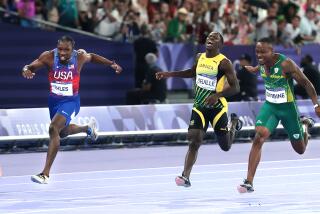100 minus 0.01 equals 7
- Share via
BEIJING — It was 1/100th of a second for the ages.
Michael Phelps won his seventh gold medal of the Beijing Games today in heart-stopping fashion, out-touching Serbia’s Milorad Cavic in the 100-meter butterfly to equal Mark Spitz’s legendary 36-year-old record.
Phelps, 23, can break the record for most gold medals in a single Olympics on Sunday morning (tonight Pacific time) if he and three teammates prevail in the 400-meter medley relay.
Phelps set an Olympic record, going 50.58 seconds to Cavic’s 50.59. Andrew Lauterstein of Australia took the bronze in 51.12, and the reigning world-record holder, Ian Crocker of the United States, was fourth in 51.13.
But for several seconds after the race, big-event suspense hung in the air at the Water Cube for the spectators and swimmers alike. It wasn’t clear who had won.
Video replays were equally confusing, and after the scoreboard showed that Phelps had won by the narrowest of margins, there was still this question:
Did Phelps touch first or didn’t he?
Though that question might be debated for years to come, Serbian swim officials were asking it immediately. There was even confusion over whether an official protest had been filed. USA Swimming officials said no, but less than an hour later, FINA, the international governing body of swimming, said yes.
USA Swimming’s Mark Schubert, the team’s head coach, said FINA confirmed that the timing system and video system were in perfect working order. They even broke down the video replay frames to a 10,000th of a second with Serb officials and Schubert on hand, USA Swimming said.
But video does not determine winners in swimming. It can be used as a backup when there is a protest. But touchpads, the plastic sensors on the wall, are the determining factor down to a hundredth of a second.
Even Phelps didn’t know he had won and tied Spitz’s mark, which had long been regarded as untouchable. He, like the rest of the crowd, remained in suspense until the times flashed on the scoreboard.
“I had to take my goggles off first to make sure the one was next to my name,” said Phelps, who was in seventh place at 50 meters.
Later, the view from the top of the Olympic podium was clear and sweet.
“I’m in sort of a dream world, sometimes you have to pinch yourself to see if it is real,” Phelps said. “It’s the smallest margin of victory in our sport. It was pretty cool.”
Meet referee Ben Ekumbo reiterated what USA Swimming had said about the timing system and video and added that Phelps was “stroking and the other [Cavic] was gliding.”
It was that final stroke that made the ultimate and historical difference. Phelps, as they say in the sport, finished with a short stroke and Cavic lost it with a longer one into the wall.
“I was starting to hurt for the last 10 meters, it was my last individual race and I just wanted to finish as strong as I could,” Phelps said. “I actually thought when I did take that half stroke I thought I had lost the race right there, but I guess that was the difference in the end.”
Cavic, who goes by Mike, won the first medal for Serbia in swimming.
The ultra-confident Cavic, who was born in Anaheim, grew up in Tustin and swam for the California Golden Bears, has Serbian and U.S. passports.
Going into the race, some experts thought he might defeat Phelps, who had set a world record in each of his six previous gold-medal performances.
“I think Mike can beat Michael,” U.S. swimmer Gary Hall Jr. wrote in a blog posting on latimes.com Friday. “An upset would be the upset of all upsets, it’s true, but I think Mike can beat Michael.”
Cavic had worked extraordinarily hard over the past year, Hall wrote.
“He endured taunt and torment from his teammates, myself included, for being overzealous with his training,” Hall wrote. “We caught him sneaking in extra workouts. Can you imagine? We were training six to eight hours a day, six days a week, and he’s got the gall, and energy, to do an extra? Without telling anyone about it?”
Cavic was asked if the timing system could have failed.
“It’s possible,” he said. “Everything is possible. The hand is quicker than the eye.”
He managed to fire up Phelps on Friday with his rhetoric.
Said Phelps: “When you see quotes in the paper saying no one will ever ever tie or break this record, it shows you anything’s possible. When you put your mind to something, anything is possible.”
His other six gold medals were in the 400 individual medley, the 200 freestyle, the 200 butterfly, the 200 individual medley, the 400 freestyle relay and the 800 freestyle relay.
His chance to pass Spitz will come on Sunday morning in the 400 medley relay. Spitz was in Detroit and used the word “epic” to describe Phelps, telling the Associated Press that Phelps was “the greatest racer who ever walked the planet.”
For Phelps, the 100 butterfly was the first of his seven gold medals here that did not come in a world-record time.
Just the same, he will receive a $1-million bonus from Speedo.
His seventh gold also moved him ahead of Spitz in one sense, considering Phelps’ seven golds came with five wins in individual events and two relays. Spitz got to seven on the basis of four individual events and three relays, all achieved in record times.
But the debate over this race will linger for years. Cavic was asked if Phelps was, indeed, the gold-medal winner.
Said Cavic: “Is Michael Phelps the gold-medal winner? If we got to do this again, I would win it.”
--
More to Read
Go beyond the scoreboard
Get the latest on L.A.'s teams in the daily Sports Report newsletter.
You may occasionally receive promotional content from the Los Angeles Times.







